Pacifier Teeth: What Causes Them and Can They Be Fixed?
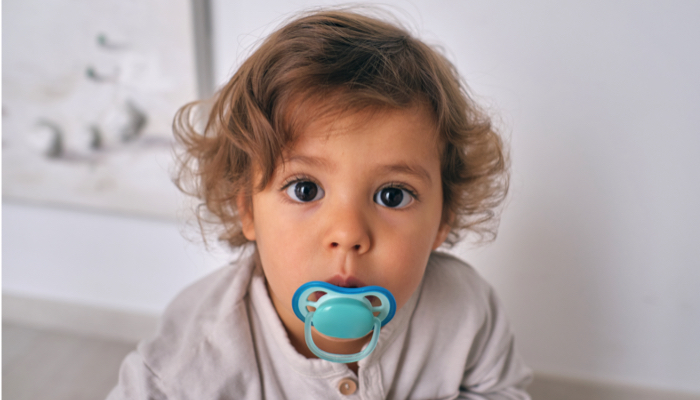
- Pacifier teeth are caused by the prolonged use of pacifiers.
- Over time, the child’s teeth move to allow space for the pacifier.
- If your child stops using the pacifier by 2 to 3 years of age, there’s a good chance their teeth might correct themselves.
If you’ve ever calmed a fussy baby with a pacifier, you know its benefits. Ask any tired parent searching for the binky in the middle of the night if pacifiers are important. They’ll likely reply with a passionate, “yes!”
In many households, a child’s pacifier is a life-saver when the baby won’t sleep. I’ve known many parents who keep multiple pacifiers in their child’s crib just in case they wake in the night looking for it. There isn’t a more popular baby item for self-soothing than the pacifier.
However, as the months pass by and your baby gets older, you might start to worry about this pacifier habit. Using a pacifier for prolonged periods of time is known to cause dental problems. Your child might develop something called “pacifier teeth” if you allow extended pacifier use.
But how long is too long? And how do you know if your child already has pacifier teeth? Is there a way to fix pacifier teeth if they already have them?
We’re here to help with all the information you need to move forward. Pacifier teeth are a common occurrence in childhood but there’s no need to panic once you have the facts.
What Do Pacifier Teeth Look Like?
If you’re wondering what pacifier teeth look like, there are many answers to that question. For some children, a pacifier could cause the front teeth to shift outward. This is commonly known as buck teeth.
Other children who have developed pacifier teeth might have crooked teeth. Or for some, their entire bite might be affected, resulting in an overbite.
If you’re concerned about your child’s teeth, an evaluation by a pediatric dentist will give you a reliable diagnosis.
What are pacifier teeth?
Pacifier teeth refer to misaligned teeth in children with prolonged pacifier use, especially past 4 years of age. Older children who still use a pacifier are at a greater risk for developing pacifier teeth.
A baby’s teeth begin to form in the womb. Their teeth continue to grow, shift, and form all throughout their childhood years. Any disruption to this process, including pacifier use, can result in misalignment.
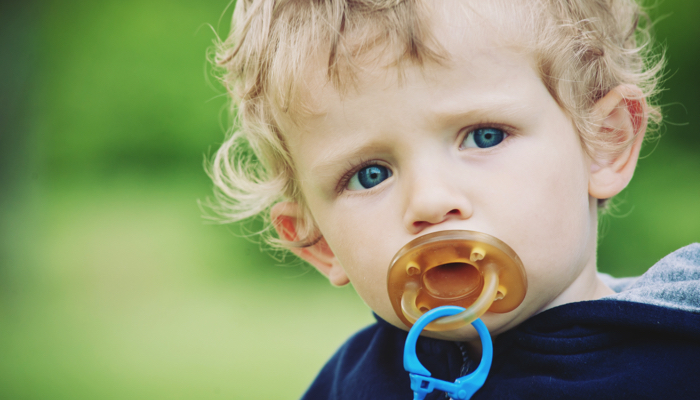
What Causes Pacifier Teeth?
Pacifier teeth are caused by the prolonged use of pacifiers. When a child sucks on a pacifier, there is increased pressure in abnormal places due to the nipple in the mouth. The constant pressure and presence of the nipple cause the teeth to adjust.
Over time, the child’s teeth move around to allow space for the pacifier. It may also cause the roof of the mouth to change shape.
At what ages will a pacifier affect your baby’s teeth?
Asking this question will likely result in a variety of answers. The American Academy of Family Physicians recommends weaning your child off the pacifier during their second 6 months of life to avoid pacifier risks. They believe this early intervention will prevent pacifier teeth and ear infections that occur from pacifier use.
However, the American Academy of Pediatric Dentistry recommends parents stop pacifier use by 18 months old to prevent short-term damage to baby teeth and by 3 years old to prevent permanent damage. They believe that non-nutritive sucking after this point might result in long-term damage to a child’s permanent teeth.
When you decide to wean your child from the pacifier is up to you. However, most agree that sometime between 2 and 3 years old is a healthy choice.
Does thumb sucking also cause pacifier teeth?
Thumb sucking can cause just as much damage to a child’s mouth as pacifier use. However, the difference is that a pacifier can be taken away while a thumb, obviously, can not. Some parents find that breaking a thumb-sucking habit is much harder than taking away a child’s pacifier.
If your child has a thumb-sucking habit, there are several things you can try to discourage it. These include:
- Using positive reinforcement to encourage your child when they don’t suck on their thumbs.
- Keeping a positive attitude to help them avoid getting discouraged.
- Talking to your child about why it’s time to stop sucking their thumb.
- Avoiding any quick-fixes like bitter nail polish or a glove, as it may cause anxiety and frustration.
Do Pacifier Teeth Correct Themselves?
There’s good news for parents concerned about their child’s dental development from pacifier use. If your child stops using the pacifier by 2 to 3 years of age, there’s a good chance their teeth might correct themselves.
If they don’t stop pacifier use until later, they will likely need orthodontic care to correct issues. A child’s adult teeth start forming at 4 years old. Braces or other orthodontic appliances are often the only solution for pacifier teeth at this point.
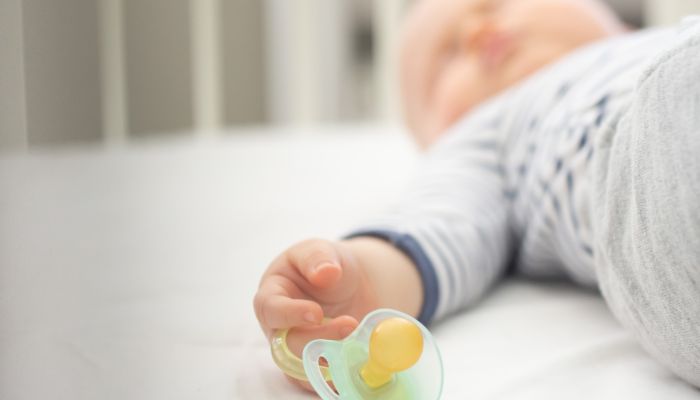
How Are Pacifier Teeth Fixed?
A specialist in pediatric dentistry will evaluate your child’s jaw, teeth, bite, and mouth. They will look closely to determine the exact support your child’s oral health needs. Depending on the situation, your child might require a dental mouth appliance to resolve the issue.
Some common orthodontic appliances used are:
- Braces
- Retainers
- Head-gear
- Bite blocks
- Expanders
- Surgery (Only in severe cases)
Preventing Pacifier Teeth
Damage to your child’s teeth from pacifiers can be avoided. When you know how to properly use a pacifier, you can use them confidently and without worry,
Try using the following tips to prevent pacifier teeth and promote good oral hygiene:
Don’t add sweet foods to your child’s pacifier.
Some parents get desperate when their baby won’t take a pacifier. This often leads to parents dipping their child’s binky in juice, jam, or other sweet foods or drinks. Doing this can increase bacteria and sugar in the mouth and lead to tooth decay.
Don’t continue pacifier use past 2 or 3 years old at the latest.
The age to stop pacifier use varies depending on whom you ask. However, we do know that the longer you wait, the less likely it will be that your child’s mouth can correct itself. A good range to stop use is in your child’s second year.
Use the pacifier for naps and nighttime.
The less your child spends with a binky in their mouth, the less likely it will be to impact their mouth. Some parents choose to only use a pacifier for nap time and nighttime for this reason. This limits the amount of continual pressure on their mouth and teeth.
FAQs
What are the benefits of using a pacifier?
Despite concerns about dental problems, pacifiers provide many benefits that outweigh the risks. There are several uses for pacifiers that prove to be helpful to many babies including:
- Provides pain relief and distraction from injuries, surgery wounds, etc.
- Reduces the risk of sudden infant death syndrome (SIDS)
- Encourages a sucking behavior in infants
- Satisfies the suck reflex, one of the many infant reflexes children are born with
- Provides a better alternative to thumb sucking
How do I wean my child off the pacifier?
Pacifier weaning can be an emotional experience for both your baby and yourself. Breaking a pacifier habit may take time and patience. Remember that your baby likely has an emotional attachment to their pacifier.
However, there are several tips that will make the weaning process a little easier. These include:
- Begin by limiting pacifiers to when they fall asleep for naps and nighttime.
- Use white noise machines as an alternative for self-soothing.
- Give your child a stuffed animal to cuddle with instead.
If you’re wondering how to get your baby to sleep without a pacifier, you might find success in having the “pacifier fairy” stop by. This fictional character is similar to the tooth fairy. She takes your child’s pacifier but leaves a reward in its place.
Other parents have used sleep training methods when removing the pacifier with success. These methods might help when all else fails to break the habit. Sometimes going cold turkey, with love, reassurance, and a new routine is the only way to move forward.
What other dental issues can pacifiers cause?
Pacifier use can cause multiple dental issues including:
- Overbite
- Open bite
- Speech impediment
- Buck teeth
- Misformed roof of mouth
Many of these teeth development issues can be avoided with early intervention and removal of the pacifier.
How often should you replace a pacifier?
A pacifier should be replaced every 4 to 8 weeks. This is to ensure you don’t have a buildup of bacteria on the pacifier.
It’s also recommended to replace the binky because they wear down overtime. A binky that is falling apart is a choking hazard. Always inspect your child’s pacifiers for cracks or other signs of wear.
Do dentists recommend pacifiers?
Yes. However, many dentists will recommend specific pacifiers designed to prevent pacifier teeth. Some of the best pacifiers for a child’s oral health are orthodontic pacifiers.
An orthodontic pacifier is designed with a flat nipple, rather than a round one. This mimics the shape of a breast nipple in your child’s mouth rather than a bottle nipple. The more natural shape creates less pressure in abnormal areas of your child’s mouth.
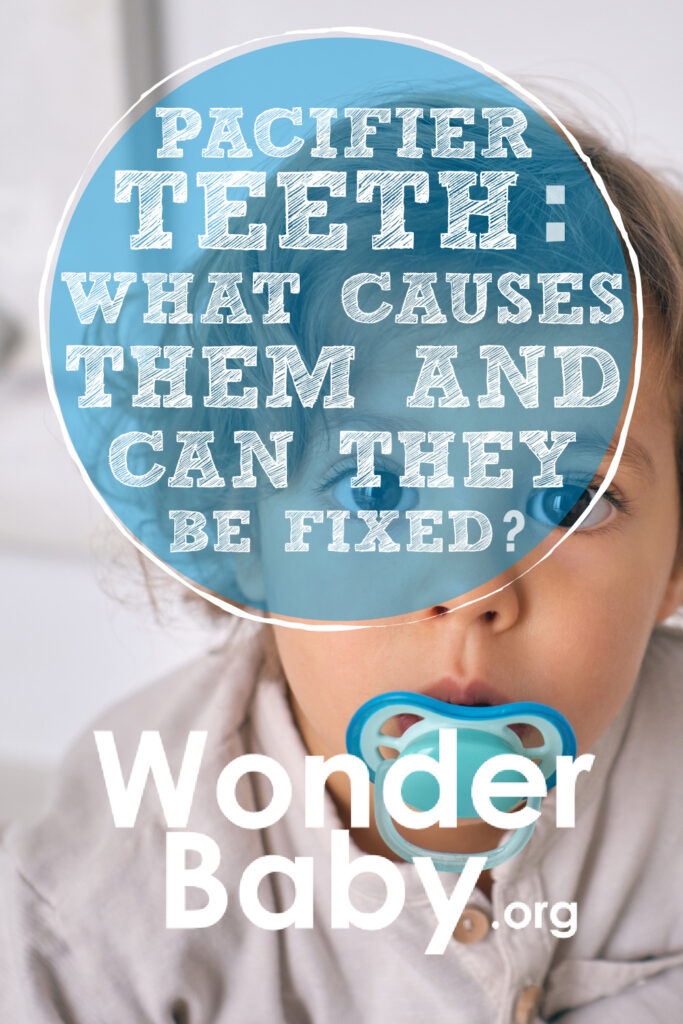
The information WonderBaby provides is not intended to be, and does not constitute, medical or other health advice or diagnosis and should not be used as such. Always consult with a qualified medical professional about your specific circumstances.
Related Posts
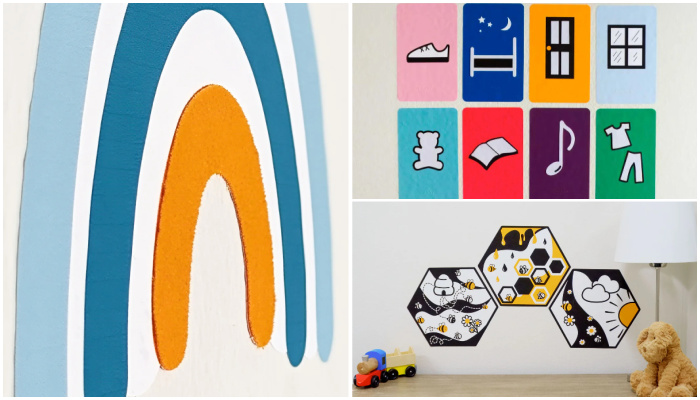
Parenting
Sensory Wall Art: 5 Tips to Create a Room Your Blind or Low-Vision Child Will Love
Even if your child can’t see their surroundings, personalizing and decorating their room with thoughtful, sensory-friendly design can make a big difference in their confidence, independence, and joy.
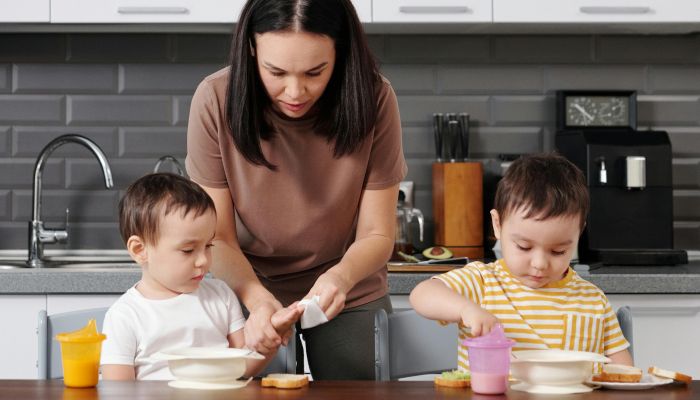
Parenting
4 Tips to Manage Twins Alone as a Single Parent
Taking care of twins alone as a single parent can feel overwhelming. Learn practical ways to help lighten the load.

Parenting
How to Manage Twin Escalation Syndrome
Discover effective strategies for managing twin escalation syndrome, including promoting individuality and fostering positive interactions.